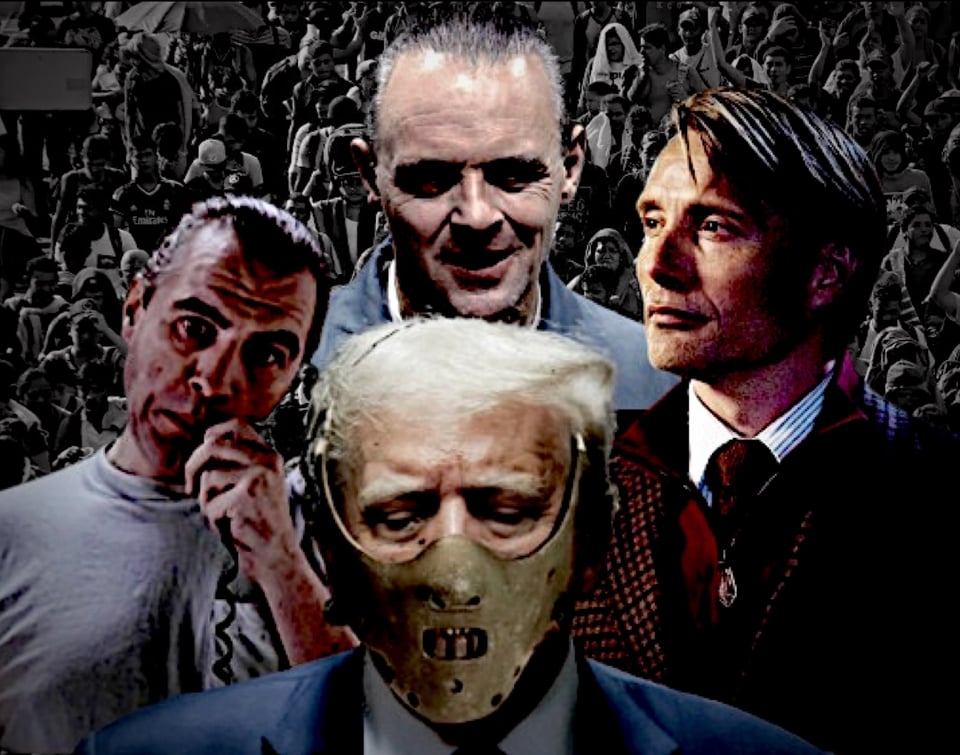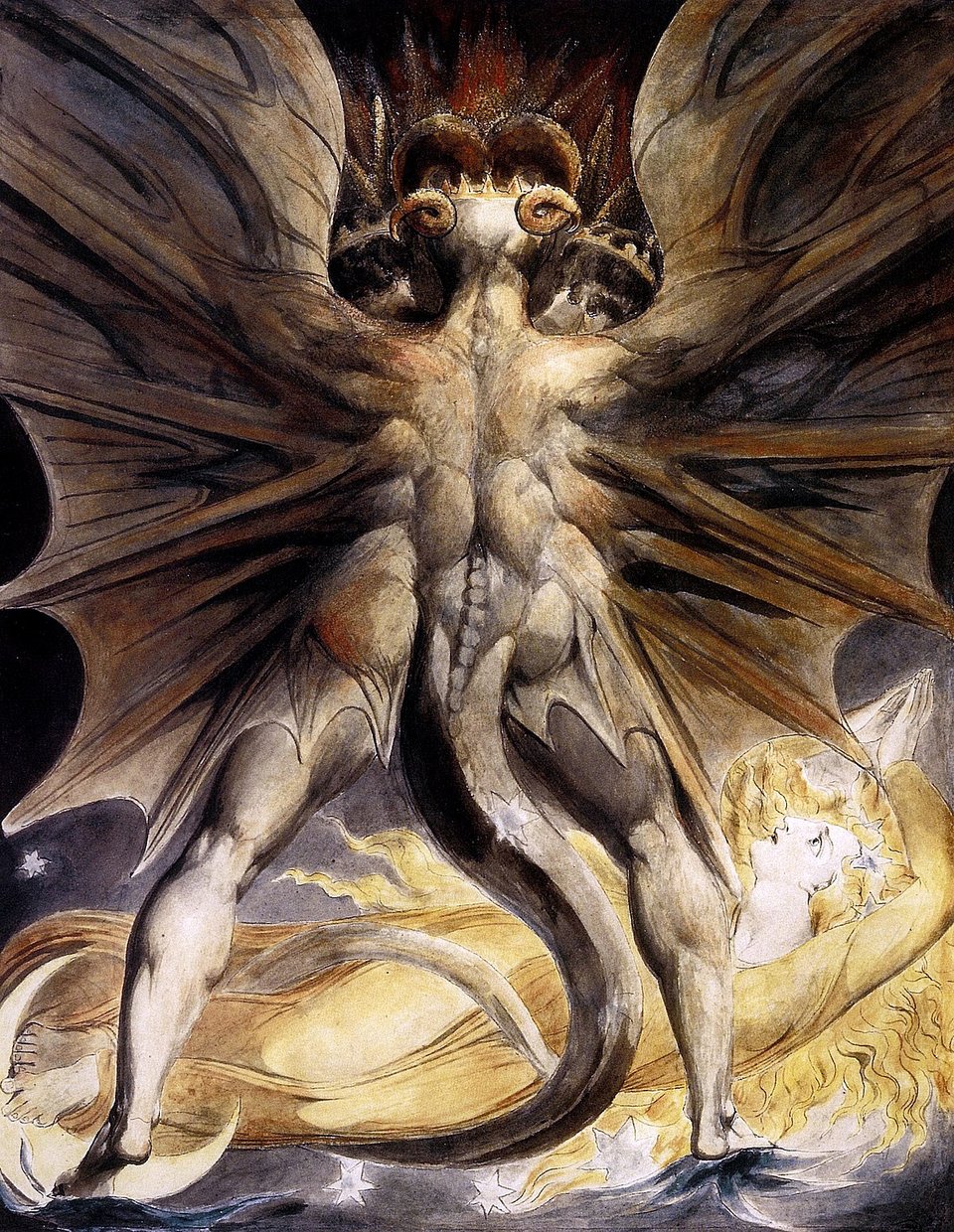On the Late, Great Hannibal Lecter


About a year ago, Donald Trump started referencing Hannibal Lecter in his stump speeches, and he hasn’t stopped. The overall idea, such as it is, consists of his usual racist dreck: scary South American countries are emptying out their mental asylums, setting loose such evil criminals as Hannibal the Cannibal on our white and virgin shores. He keeps repeating it—at CPAC, at the RNC, at his big sweaty rallies. He lauds “the late, great Hannibal Lecter.”
I don’t, as a rule, like to let Trump dictate what I think about. This is particularly true today, when his election opponent has revealed a refreshing and earnest VP pick in Minnesota Governor Tim Walz, and the Democratic vibes, on the whole, are astonishingly sane and normal. Trump, meanwhile, is the guy who mutters incessantly about Hannibal Lecter. So... let's talk about that, a little, as this long, long era of one weird old guy dominating political conversation hopefully sputters towards oblivion. Living in Trumplandia for the last decade has felt like an exercise in forensic psychology: projecting one’s own mind, one’s empathy, into a diseased, bizarre psyche. Hence, for example, me knowing, almost against my will, about Trump’s obsessions with hairspray, windmills, shower pressure, sharks, and, of course, Hannibal Lecter.
At the very least Hannibal the Cannibal is a toothsome figure to consider. Lecter, as a character, has enthralled audiences ever since Thomas Harris introduced the good doctor to readers with the publication of Red Dragon in 1981. Lecter’s iconic status was solidified with the phenomenal success of Silence of the Lambs—both in print and on screen—and the delicate, dreamy, disgusting TV series Hannibal (2013-2015), a feast for the eyes in the form of Mads Mikkelsen as the titular doctor, and also a homoerotic psychodrama for the ages. Lecter endures as a figure in contemporary culture because he is the chief embodiment of an archetype created from our basest cravings: the evil genius, the brilliant sadist who creates, of violence, an art form. That this figure arose at the tail end of the serial-killer decade, the ‘70s, is not entirely unsurprising: it is much less scary to imagine that there are brilliant deviants who kill and kill and run rings around the cops because of their hyperintelligence rather than acknowledge the simple fact of the matter in most homicides, serial and not: the authorities are neither omniscient nor particularly competent.
There’s been a fair bit of theory-flavored banter thrown around concerning Trump’s Hannibal fixation; it occurred to me, and a bunch of other people, that there might be a fundamental point of confusion here, between “asylum” (mental) and “asylum” (refugees seeking). An impressive investigation from New York Magazine casts doubt on the point. More likely, this is the usual thing when it comes to Trump—some half-remembered political scandal, in this case, the 1980 Mariel boatlift, in which Fidel Castro allowed some 125,000 Cubans to emigrate to the US. It became a flashpoint in a number of ways: a persistent myth held that Castro had “emptied the prisons and asylums” and the Marielitos were dangerous criminals; a widespread, vicious—and debunked—headline in the last of the Carter years helped spur both the movie Scarface and an ugly movement to make government forms available in English only, not Spanish. There were also a few academic studies about the way an influx of immigrants could affect native labor. On the cusp of the Reagan years, the dominant academic conclusion was that immigrants depress both native jobs and wages. Of course, the reality is more complicated. As a Time retrospective put it:
“In order to save face, Castro put forward the narrative that the Cubans who sought to leave the island were the dregs of society and counter-revolutionaries who needed to be purged because they could never prove productive to the nation. This sentiment, along with reports that he had opened his jails and mental institutes as part of this boatlift, fueled a mythology that the Marielitos were a criminal, violent, sexually deviant and altogether ‘undesirable’ demographic.
“In reality, more than 80% of the Marielitos had no criminal past, even in a nation where “criminality” could include acts antithetical to the revolutionary government’s ideals. In addition to roughly 1,500 mentally and physically disabled people, this wave of Cubans included a significant number of sex workers and queer and transgender people—some of whom were part of the minority who had criminal-justice involvement, having been formerly incarcerated because of their gender and sexual transgression.”

Not incidentally, Stephen Miller, Trump’s rancid-egg-shaped immigration impresario, has used the enduring myths around the Mariel boatlift to demonize all asylum-seekers and refugees in a crusade to choke off all immigration to the US. Could this have filtered upward to Trump over the years, resulting in the “emptying the asylums” rhetoric, coupled with the fragmented memories of a man who, in 1980, was in his thirties, cresting the Gordon Gekko wave into the gilt-edged legend he rode into the White House? We all live with the ghosts of our youth flickering within us, and it can be argued that some part of Trump’s brain will always be living in 1982 or so.
Add the half-remembered, jumbled characterizations of the Mariel boatlift (among other things, Cuba is not in South America and Fidel Castro is dead) to the usual Trump info-filter: something he thought he saw on TV. (Trump frequently conflates Lecter the character with the various actors who have played him, and furthermore has claimed that said actor is a real Trump enthusiast, which Anthony Hopkins, beloved and adored weirdo, most certainly is not, nor are any of the other Hannibals who came before and after him, Brian Cox, Mads Mikkelsen et al). But the art of trying to cast oneself into Trump’s mind—to become a psychic, a profiler, a connoisseur of strange evils—is in and of itself to become an (even unwilling) part of the same myth that bred Hannibal Lecter, and that bred the notion of Trump as some mysterious and unreadable force that has to be parsed, carefully, carefully.
It’s easier, in some sense, to imagine Trump as a savant—not spray-tanned but leathered, incredibly cunning, all that showmanship a cover for strategic chessmanship—than to submit to the rather more evident notion that a very large portion of America is in thrall to the idea of a strongman, a rich strong daddy man who will take the bad guys away and hurt the people they want to see hurt. The psychosexual/neo-Freudian elements of the matter are crude and hard to look at. It’s easier to think of Trumpism as a massed enigma of evil forces, just as it’s easier to imagine that serial killers are geniuses—it’s easier to reconcile than the notion of millions of Americans being basically cruel, or of cops who couldn’t give less of a shit if you get killed in your bed.
The Sword and the Sandwich is a newsletter about deadly serious extremism and serious sandwiches. Please consider supporting this work with
a paid subscription.
The myth of the serial killer as genius stems from a consistent inability—a need, in fact—to ignore this inconvenient fact about the authorities, though it is true. The Green River Killer, Gary Ridgeway, was able to murder nearly fifty people between 1982 and his apprehension in 2001 not because he was a genius (his IQ was estimated to be in the low 80s) but because the women he killed were, for the most part, sex workers and runaways—disposable people the law didn’t have much use for. In 2023, with the benefit of DNA analysis and all sorts of things chainsmoking cops didn’t have in the 1970s, the homicide clearance rate in the United States stands at less than 50%. It’s scary to know that there’s a better-than-even chance that if you get killed, the cops won’t solve it, whether out of lack of motivation or lack of ability. Better to imagine a diabolical genius whose brain runs on a kind of brilliantine psychopathy than to sit in the sour rank smell of just how bad our beefed-up police state is at anything other than bonking protesters on the head.
Thus the mythmaking in the Hannibal Lecter media universe extends far beyond the cell door of the great and evil doctor. It’s also in the brilliant eidetic empath FBI profiler Will Graham; in the avuncular and hardbitten FBI agent Jack Crawford; in the caring, meticulous brilliance of Clarice Starling; and, in the novel Red Dragon, whence the whole series started, the determined forensic odontologists, fingerprint analysts, hair typists and so on who are working around the clock, driving themselves near mad, to solve byzantine crimes and prevent civilian deaths before they happen. (That the crimes themselves are baroquely evil is also pleasing: in Red Dragon, the serial killer du jour is known by the sobriquet the Tooth Fairy; he and Lecter correspond by means of a code picked out from the pages of the Joy of Cooking; the title of the novel comes from a painting by William Blake, The Great Red Dragon and the Woman Clothed With the Sun, with whom the Tooth Fairy feels a mystical connection).

All of it is an elaborate fantasy, of course—but the fantasy elements are not so much the depravity and violence of the killers as the Manichaean dichotomy of the narrative: that thoughtful, earnest cops tax their resources to the utmost, sparing no expense, in pitched battle with a genius of equal measure. That such people would solve your murder, because they are good—in Will Graham’s case preternaturally good—at solving murders. It’s an authoritarian fantasy, at its core, a story of muscle, brain, and the law working together to snuff out evil. It scratches the itch that makes us want the right guys, the good guys, to be in charge.
It hardly takes an eidetic memory or preternatural empathy—let alone the purring, sadistic cunning of a cannibal killer—to try and put your brain in Trump’s pickled one. Part of the reason the last decade or so has been so oppressive is because of his ubiquity; his weird, mincing mannerisms; that Florida-orange complexion; the increasingly odious people who serve as his claque. This basically venal, racist, misogynistic pig has often been portrayed in our press as a political genius (maestro of the proverbial “four-dimensional chess” which he is sometimes depicted as playing) because he caught a lot of reporters on the back foot in 2016.
But all he’s ever really done was have a basic showman’s ability to galvanize a crowd; a basic sense of the worst of human nature (including the authoritarian desire for security, shown in his selective lauding of “law and order,” and the obsession with immigrants that led him to reference Dr. Lecter in the first place); and an eye for the odds fitting a casino owner, the way the Electoral College is stacked like an Atlantic City gambling den. He’s a collection of shambling ‘80s-vintage tics and grievances in a bad suit, and no more of a genius than Gary Ridgeway ever was, just possessed of a basic animal cunning and an ability to tack into favorable winds. Being forced inside his ugly little mind has been a torment even for those of us without Will Graham’s Stradivarius of a heart.
I don’t want to go inside Trump’s head for the same reason I don’t want to reread Lolita: I don’t want to live in a rapist’s mind. I don’t want to analyze his patterns, and I don’t want to be soaked in this ugliness. I want the cell door to close behind me as I leave him forever, behind metal and glass, and be done, done, done with him. The thought makes me dizzy at the freedom it portends. In a certain sense I wish Trump was a Lecterian genius. But that was always a myth to make us feel better. The ugly truth is all that it ever was: some people want to hurt people, and the people that are supposed to keep them at bay can’t, or won’t, or don’t want to. It’s up to us to lock the nightmare behind the door. That’s scary! What a responsibility is on us. Scarier than Anthony Hopkins in his infamous muzzle, than an evil Tooth Fairy. Such is the desire to abdicate even the small amount of authority citizenship in a democracy confers that for a decade we have been crouched in the burnt-umber shadow of a hollow colossus. It’s high time to bust out. Because the cavalry was always us, all along.

-
My goodness. This is chock full of "news to me" and interesting ideas; I feel like calling it genius. I think you're on to something, and I concur with wanting to close the cell door with finality. I hope you have a way to cleanse your mind and spirit after marinating in these thoughts and the research.
-
Those of us wise enough to read your newsletter know all this about Trump. I really can't spend any more of the precious time I have left to absorb another take on this holearse when there is only so much finite time in a day -- not to mention, all the other things one can study, learn and/or get excited about.
I appreciate you, your opinions, et al but please...no more Trump. I know where I can go if I need some self-injected venom.
-
Applause emoji 3 x!
-
These are much more pedestrian ideas, but your piece really made me think about two particularly annoying turns of phrase of the Trump decade discourse, really just two versions of the same form of gaslighting:
-
One, the fact that the same people who spent 8 years calling a Chicago machine Democrat's very market friendly policies "Communism" then had the gall of coming up with "Trump derangement syndrome".
-
Two, the concoction of the phrase "Orange Man Bad" as just, the most idiotic way of turning criticism of Trump on its head as if somehow removing some words reveals that the person stating the obvious is the dumb one. Sure, let's curb carbon emissions because "climate change real". Sure, let's wear masks because "corona contagious". Sure, let's not drink that bottle because "cyanide poison".
Anyway, just some pedestrian thoughts that I needed to put in writing, and also, it seems like there's signs that we're finally past this era of particularly stultifying political discourse and we may be moving into one where at least we can call it as we see it.
-
-
This piece is so fucking brilliant. I subscribed for the sandwiches and now baby, I am paying for it all. Thank you!
-
↳ In reply to Tal Lavin
You do good work. Don't stop! I believe way too many Americans (even after so many years of psychological warfare waged by Trump and the crazies around him) still do not fully understand that Trump has mastered the use of propaganda to undermine and weaken and take over this country, for his own benefit, and therefore represents a truly grave threat to all of us. So, repeat, revise, and repeat again and again the message about Trump, about who and what he is, and about what he will try hard to do to us if he returns to 1600 Pennsylvania Ave. Trump must be stopped, and your messaging will help do that. Thank you!

Add a comment: